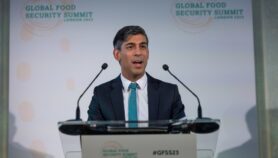24/09/21
UN summit calls for climate-friendly food systems

By: Dann Okoth
Send to a friend
The details you provide on this page will not be used to send unsolicited email, and will not be sold to a 3rd party. See privacy policy.
The United Nations has urged the world to urgently review its food production and consumption patterns in order to save the planet, at a landmark summit beset by controversy and boycotts.
In a keynote speech at the historic UN Food Systems Summit held online on Thursday, UN Secretary-General Antonio Guterres said the world must adopt natural alternatives to industrial agricultural practises that protect the planet as it battles rising hunger, malnutrition and obesity.
“It is possible to feed a growing global population and still safeguard the environment,” Guterres told delegates at the summit, held on the sidelines of the UN General Assembly in New York.
“In any event, the poor need practicable, easy-to-implement policies that can immediately impact their lives, not some lofty ideas, discussed at such exclusive high levels.”
Michael Fakhri, lead UN independent expert on the right to food
“It takes the smart, sustainable management of natural resources — from farms to fisheries,” he added, urging countries to go to COP26 in Glasgow with “bold, targeted plans to keep the promise of the Paris Agreement”.
Sustainable, or climate-smart agriculture seeks to use techniques such as using different types of plants side-by-side to reduce the need for pesticides and industrial equipment.
Guterres said food systems currently account for one third of all greenhouse gas emissions and are responsible for up to 80 per cent of biodiversity loss.
Sustainable food systems would be a major conduit to achieving the UN Sustainable Development Goals (SDGs) by 2030, he added.
The summit is the culmination of 18 months of discussions involving political leaders, agri-business, communities and civil society to chart pathways for the future of food systems across 148 countries.
Its stated mission was to unleash “ambitious new actions, innovations and plans” to transform global food systems and leverage these changes to deliver progress across all the SDGs.
Science and innovation was hailed as fundamental to achieving such a radical shift.
Joachim von Braun, chair of the summit’s scientific group, said that “food systems can and must be climate neutral”, adding: “Most food systems are not sustainable. Therefore science must not only address production and consumption or the value chain, but the whole food system.”
He also emphasised the importance of indigenous knowledge and human rights — including the right to food — in the global food system.
The summit was boycotted, however, by a large number of civil society groups and scientists who claimed big agribusinesses had been integral to the summit process at the expense of small-scale producers and indigenous people — which the UN strongly denied.
Peter Ofware, Kenya country director at HealthRight International, a non-governmental organisation, was unconvinced that the talks benefited those most affected by food systems.
“The most severely impacted by food systems are pregnant women and young children in poor rural African settings. I’m exactly not sure how they were represented at the summit,” Ofware told SciDev.Net.
“In any event, the poor need practicable, easy-to-implement policies that can immediately impact their lives, not some lofty ideas, discussed at such exclusive high levels.”
Michael Fakhri, the leading UN independent expert on the right to food, delivered a scathing verdict on the summit, declaring it had categorically failed.
“COVID-19 has not been on the summit agenda. Governments and businesses have been too slow responding to the pandemic, pushing millions of people across the world to hunger and poverty,” he said in a video posted on Twitter.
Agnes Kalibata, the UN Secretary-General’s special envoy for the summit, called for more youth and women’s involvement in global food systems, echoing the slogan “nothing is for us without us” adopted by young people at the summit.
“We need to work together all of us, including women and youth, to embrace a global food system that works and benefits all of us,” she said at the summit opening.
But investment will be needed to meet the actions targeted and scientists have highlighted the need for accountability mechanisms to hold governments to account.
Nana Akufo-Addo, President of Ghana, was one of a number of global South leaders who pledged to reform their national food systems to align with the UN proposals.
“Our current food system does not assure sustainability, safety, equity, access and health and must therefore be reformed,” Addo said.
He listed a raft of measures, including increasing production of climate resilient varieties of vegetables, legumes, fruits and bio-fortified cereals by 40 per cent using sustainable agricultural methods, and developing and implementing food-based guidelines by 2022.
This piece was produced by SciDev.Net’s Global edition desk.















